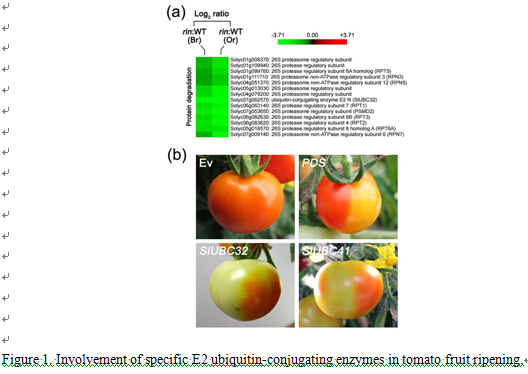Fruits are unique to flowering plants and play a central role in seed maturation and dispersal. Molecular dissection of fruit ripening has received considerable interest because of the biological and dietary significance of fruit. The scientists from Institute of Botany, Chinese Academy of Sciences found that specific E2 ubiquitin-conjugating enzymes are involved in ripening process of tomato fruits.
Transcription factor RIPENING INHIBITOR (RIN) represents the master regulator of fruit ripening. To understand the regulatory mechanisms underlying fruit ripening, the changes in nuclear proteome were evaluated in the rin mutant tomatoes fruits. A set of proteins were identified and particular attention was paid to SlUBC32 and PSMD2, the components of ubiquitin-proteasome pathway. Through chromatin immunoprecipitation and gel mobility shift assays, RIN was found to directly bind to the promoters of SlUBC32 and PSMD2. Moreover, loss of RIN function affects protein ubiquitination in nuclei. SlUBC32 encodes an E2 ubiquitin-conjugating enzyme and a genome-wide survey of the E2 gene family in tomatoes identified five more E2s as direct targets of RIN. Virus-induced gene silencing assays show that two E2s are involved in the regulation of fruit ripening.
Ubiquitin-mediated protein proteolysis has been shown to play an important role in many basic cellular processes in plants. However, the functional importance of protein ubiquitination on fruit ripening remains unclear. The findings of this study uncover a novel function of protein ubiquitination, identifying specific E2s as regulators of fruit ripening. These findings contribute to the unraveling of the gene regulatory networks that control fruit ripening.
It has been published in Genome Biology on 3 December (doi:10.1186/s13059-014-0548-2). Yuying Wang and Weihao Wang in Professor Shiping Tian’s lab, are the co-first authors of this paper. The study obtained funding from the major state basic research program of China (973) and the National Science Foundation of China.

Fruits are unique to flowering plants and play a central role in seed maturation and dispersal. Molecular dissection of fruit ripening has received considerable interest because of the biological and dietary significance of fruit. The scientists from Institute of Botany, Chinese Academy of Sciences found that specific E2 ubiquitin-conjugating enzymes are involved in ripening process of tomato fruits.
Transcription factor RIPENING INHIBITOR (RIN) represents the master regulator of fruit ripening. To understand the regulatory mechanisms underlying fruit ripening, the changes in nuclear proteome were evaluated in the rin mutant tomatoes fruits. A set of proteins were identified and particular attention was paid to SlUBC32 and PSMD2, the components of ubiquitin-proteasome pathway. Through chromatin immunoprecipitation and gel mobility shift assays, RIN was found to directly bind to the promoters of SlUBC32 and PSMD2. Moreover, loss of RIN function affects protein ubiquitination in nuclei. SlUBC32 encodes an E2 ubiquitin-conjugating enzyme and a genome-wide survey of the E2 gene family in tomatoes identified five more E2s as direct targets of RIN. Virus-induced gene silencing assays show that two E2s are involved in the regulation of fruit ripening.
Ubiquitin-mediated protein proteolysis has been shown to play an important role in many basic cellular processes in plants. However, the functional importance of protein ubiquitination on fruit ripening remains unclear. The findings of this study uncover a novel function of protein ubiquitination, identifying specific E2s as regulators of fruit ripening. These findings contribute to the unraveling of the gene regulatory networks that control fruit ripening.
It has been published in Genome Biology on 3 December (doi:10.1186/s13059-014-0548-2). Yuying Wang and Weihao Wang in Professor Shiping Tian’s lab, are the co-first authors of this paper. The study obtained funding from the major state basic research program of China (973) and the National Science Foundation of China.

